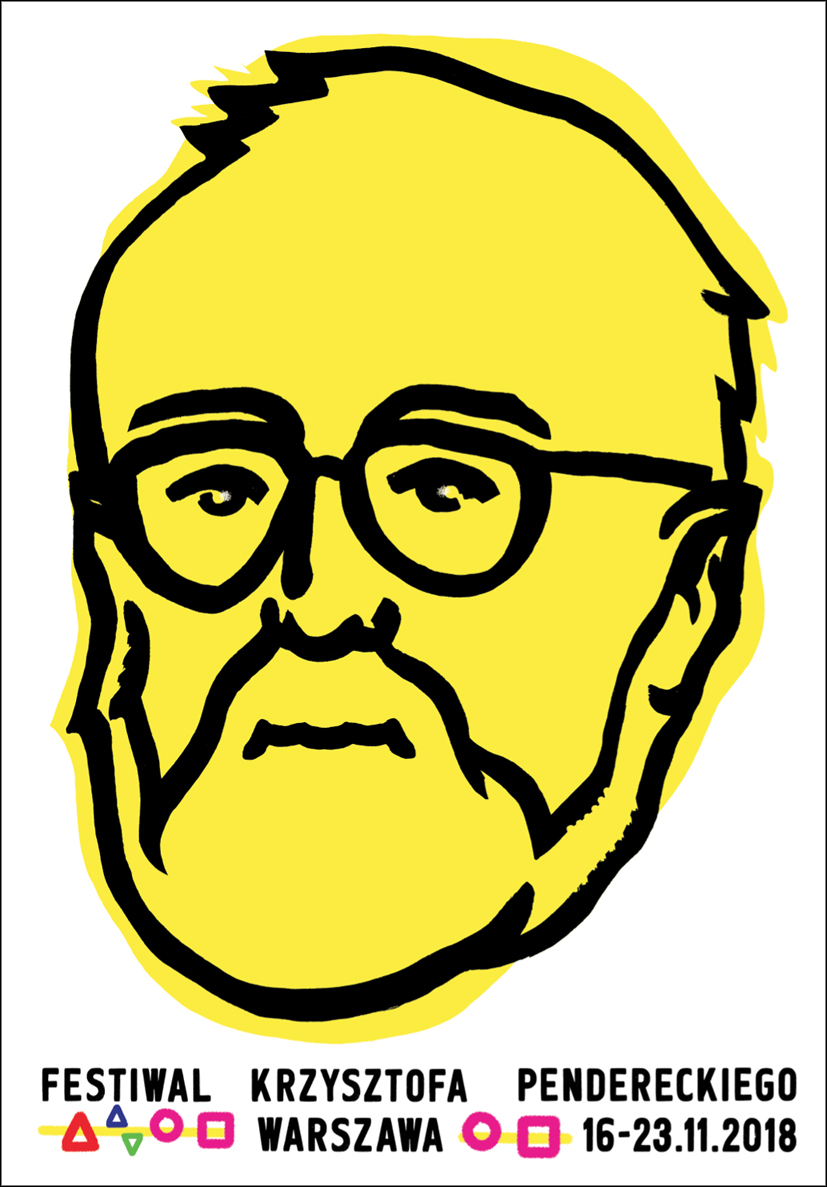Krzysztof Penderecki Festival on the occasion of the composer’s 85th birthday
19 November 2018, 7:30 p.m.
National Philharmonic in Warsaw

Massimo Mercelli | flute
Polish Sinfonia Iuventus Orchestra
Szymon Morus | conductor
Krzysztof Penderecki Sinfonietta No. 2
Patrick Gallois | flute
Michel Lethiec | clarinet
Polish Sinfonia Iuventus Orchestra
Piotr Sułkowski | conductor
Krzysztof Penderecki Double Concerto for Flute, Clarinet and Orchestra
Elina Vähälä | violin
Maya Bogdanović | cello
Polish Sinfonia Iuventus Orchestra
John Axelrod | conductor
Krzysztof Penderecki Double Concerto for Violin, Cello and Orchestra
Polish Sinfonia Iuventus Orchestra
Eduard Topchjan | conductor
Krzysztof Penderecki Symphony No. 5 “Korean”
“Please wish me as much time as possible, because I have more ideas in my head than I am able to write down. My whole life looked like this – busy days, a tight schedule every day, more and more commissions. I’m sure it’ll stay that way, because I’m not planning on retiring”, said Krzysztof Penderecki in an interview with Paula Szynol in 2016, and these words remain valid even now, when the great composer is celebrating his 85th birthday. For the next generation of musicians and music lovers, he is still the one who has “always” been there, being an important point of reference – whether it is affirmative or polemical. The Maestro himself stresses that he likes to cause controversy: “All my life, I went against the current. Orchestras did not want to play my music, they went on strikes. The musicians were afraid for their instruments, because I had them, for example, strike the body of their violin or cello with the metal frog of their bows. It made me happy that they protested. I thought I was right.” After an early period in which he was seen as the coryphaeus of the most extravagant modernism, he surprised the audience with a gradual turn to tradition, as he explained in an interview with Anna S. Dębowska, 2008: “I once said, and I still maintain it, that it was not I who betrayed the avant-garde, but the avant-garde that betrayed the music. And time showed that I was right, because the avant-garde ended in the early 1970s, and then it was just copying old ideas. I didn’t want to write this way any more, I decided that it was a road to nowhere, so I had turn back from it and reach a truce with tradition”. Successive jubilees are an opportunity for retrospective concerts and festivals, evoking his music from different periods and showing its fascinating changeability and at the same time its timeless topicality.
The Polish Sinfonia Iuventus Orchestra will take part in the Krzysztof Penderecki Festival, which will take place in Warsaw from 16 to 23 November. The programme will include ten concerts in the National Philharmonic Hall, the Grand Theatre – National Opera and the Royal Castle. The organizers of the festival are the Ludwig van Beethoven Association, the Krzysztof Penderecki European Centre for Music, the National Centre for Culture, Ludwig van Beethoven Academy Association, the Krzysztof Penderecki Akademia Association and the International Centre for Music.
In the programme of the very original concert on 19 November, the orchestra will be led by as many as four conductors – each of them was linked with the Master by a fruitful and inspiring cooperation (“Penderecki is like a mentor to me and almost like a father. I had the privilege of conducting many of his works, from string works through concerts to symphonies. He gave me an insight into the Polish soul,” wrote American conductor John Axelrod, one of the evening’s bandleaders), each of them will present his vision of a chosen symphonic and concert work. The monumental Symphony No. 5 from 1992 is called “Korean” due to the commission by the International Cultural Society of Korea and subtle musical references to the history and culture of the Far East – but it is also an autonomous work, entering into an interesting discourse with the symbolism of titanic “fifth symphonies” in the work of the masters of this genre, starting with the legendary work of Beethoven. The remaining works are of the concertante type, giving an opportunity to show off to excellent soloists. Particularly interesting and unusual will be the juxtaposition of two very different hue variants of the double concerto, a relatively new work (2012), already triumphing on the world’s stages. It will be heard in a string version for violin and cello (originally – viola) and a wind version, for flute and clarinet. The pair of solo instruments is treated equally here, both of them have impressive, extensive solo cadences, with a perfect balance of concerto and orchestral parts. Sinfonietta No. 2 is another example of sound metamorphoses of the original work, the breakthrough Quartet for Clarinet and String Trio from 1993, enchanting with its classicist style referring to the superior ideas of old chamber music: transparency, balance, architectural and textural discipline. The success of this work resulted in its transformation into the Sinfonietta with the participation of a string orchestra, and then this work also saw a variant, in which the clarinet was replaced by a flute (there is also an original version for four saxophones).
Organizer: Stowarzyszenie im. Ludwiga van Beethovena
